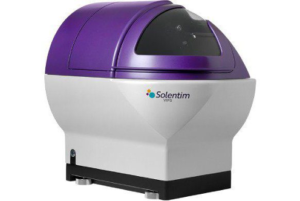
The Importance of Monoclonality in Cell Line Development: The Solentim VIPS Advantage
Single-cell cloning (SCC) is a critical step in monoclonal cell line development (CLD), which is widely used across the biopharmaceutical industry for production of recombinant proteins antibodies, vaccines, and for the development of stem cell and chimeric antigen receptor (CAR) T cell therapies.
In a typical biologics workflow, mammalian host cell lines such as CHO, preferred for their ability to produce proteins with human-like post-translational modifications, are transfected with the gene of interest, which results in a heterogeneous transfection pool. Large numbers of single-cell clones must be screened for productivity, stability, and product quality, which is a rate-limiting step in CLD that is both time and resource intensive. Promising candidates are subsequently selected for further characterization and upscaling for commercial production.
Traditionally, SCC is accomplished using limiting dilution, but a drawback of this manual method can still lead to some wells of the plate having multiple cells thus requiring further subcloning to ensure monoclonality, which can extend cell line development timelines. Furthermore, proof of clonality is in important regulatory requirement documenting the clonal origin of the progenitor cell producing the therapeutic. The need to improve SCC workflows for faster clone generation while providing assurance of monoclonality has led the emergence of enabling technologies like the Solentim Verified In-situ Plate Seeding (VIPS™) from Advanced Instruments.
The Verified In-situ Plate Seeding (VIPS™) System
The VIPS automated single-cell cloning system is a unique “all-in-one” instrument, which combines gentle low-pressure single-cell seeding with immediate image confirmation of the single cell in the destination well after dispensing and culture media addition. It enables a high throughput end-to-end cloning workflow from single-cell isolation, clone verification, to colony growth tracking with a high degree of accuracy and consistency. The VIPS system is designed to seed one cell per well of 96 and 385-well plates, by repeatedly dispensing 30 nL (nanolitre) droplets until a cell is detected. The system then takes 20 z-stack images through the droplet to confirm presence of a single cell at the bottom of a dry well. Advanced imaging analysis discriminates single cells from debris, empty wells, aggregates and reduces the incidence of ghost wells (false negatives). Following detection of the single cell in the droplet, growth medium is added to the well through a separate channel and the whole well is imaged by the VIPS system providing crucial ‘day 0’ evidence of clonality. The combination of a droplet and whole-well images both depicting a single cell on day 0 provide proof that the colony is clonally derived, offering a Double-Lock of clonality assurance. The Double-Lock assurance of clonality leads the industry as the gold standard by providing key advantages over other methods.

Firstly, ‘Double-Lock’ analytical assurance removes the need for subcloning, which is a gamechanger for CLD workflows. Double-Lock refers to the way that the VIPS system employs two assurance steps to ensure clonality. The first step being an image of a single cell in the droplet taken immediately after seeding. The second step depicts a single cell in a whole-well on day 0 with subsequently daily images to monitor clonal outgrowth.
This system provides a significant advantage over other systems that are not able to demonstrate single cell dispensing from inside the well, limiting users’ understanding if a single cell was seeded and if it was seeded in isolation. The time needed for single cell cloning workflows is cut by more than 50% with the VIPS system compared to a typical two step limited dilution methodology. InstiGRO™ cell culture growth supplements, part of the Solentim portfolio, are animal component-free cell culture reagents for CHO and HEK cells that are optimized to support early cell growth and survival conditions greatly. They are designed to work with the VIPS system automation and the combination of these two products offer significant workflow improvements by increasing successful colonies per plate. In addition, Solentim MatriClone™ is a new matrix designed to support iPSC growth in single seeding workflows while maintaining pluripotency. MatriClone is optimized for ‘in-solution’ seeding and optically suited for automated imaging.
By integrating the VIPS system into their workflows, the CLD group at Janssen R&D was able streamline their development process and effectively reduced timelines by 4-6 weeks per CLD project, allowing the group to execute more projects per year and achieve higher productivity.
“With our previous system from another manufacturer, we didn’t have the proof of monoclonality which is a huge aspect of CLD. We had to subclone to ensure that each colony was derived from a single cell, which extended our timelines. With the VIPS system, we have absolute proof of a single cell in a well at two timepoints, so we’ve been able to speed up our workflows.” Angela Tuckowski, former Associate Scientist, Janssen R&D LLC.
VIPS also pulls together all the data and high-resolution images from single cell seeding, day 0 to colony outgrowth, providing a full audit trail of each high-value clone in a comprehensive digital Clonality Report that can be used directly as documentation to satisfy regulatory requirements. The wrap-around VIPS Clonality Report has a strong demonstrated track record of IND submission success with global regulatory agencies.
“The cell line generation report (or clonality report) has satisfied our IND filing requirements for the Chinese NMPA.“ Andy Tsun, PhD, Co-Founder and VP of Discovery Biology, Biotheus Inc.
The VIPS system reduces project timelines, compared to other methods, and decreases risk of error, operational workloads and associated costs. High seeding efficiency of viable cells for both 96 and 384-well plates with good colony outgrowth, in combination with the identification of monoclonal wells gained through a single round of cloning can reduce the number of screening plates required from the outset enabling projects to be completed in less time with decreased operational workloads.
Learn how the VIPS system by Advanced Instruments can transform your CLD workflow here: https://www.aicompanies.com/single-cell-seeder/vips/